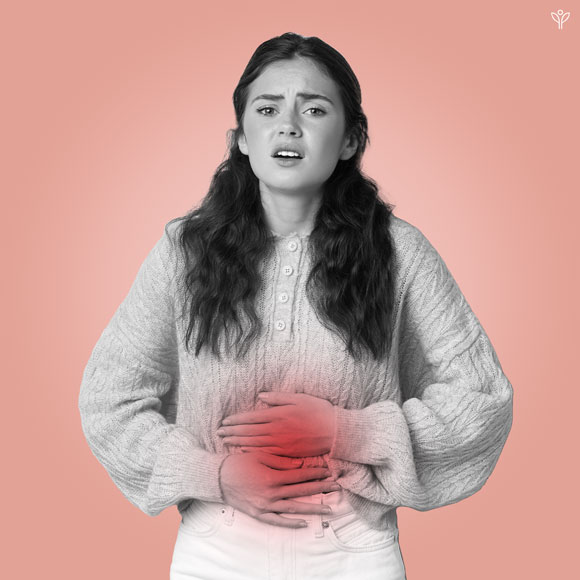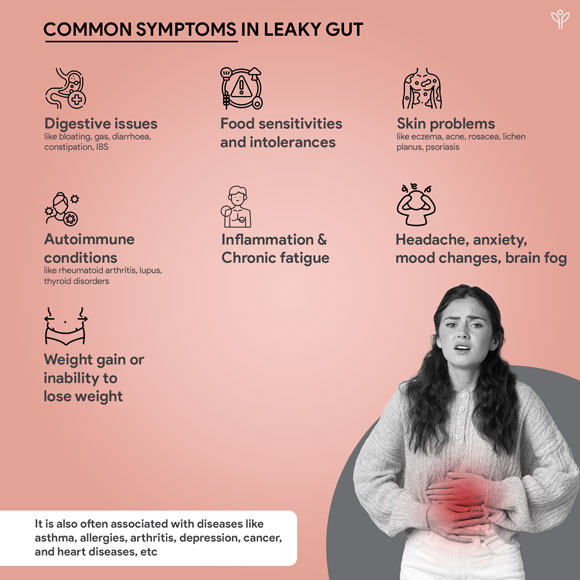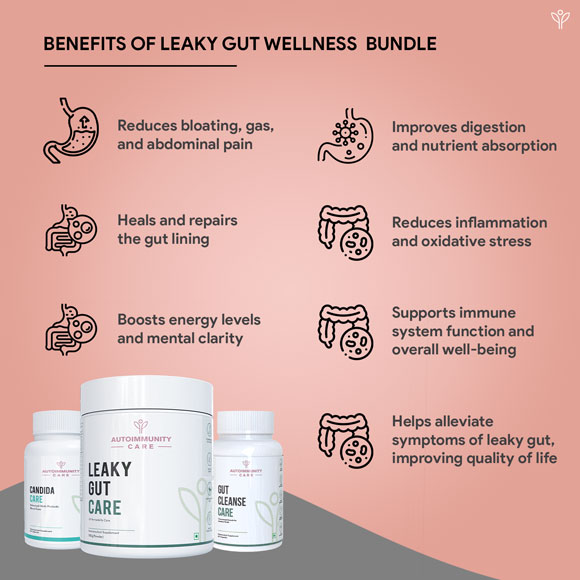




Leaky Gut
AIC’s Leaky Gut Wellness bundle is a comprehensive bundle that combines the power of leaky gut care, gut cleanse care, and S. Boulardii care to target the root causes of gut permeability. It eliminates pathogens, reduces inflammation, REPAIRS damaged gut lining, ELIMINATE toxins, and RESTORE a healthy gut microbiome.
Understanding Leaky Gut
Leaky gut is a condition in which the small intestine becomes overly permeable, allowing undigested food particles, toxins, and microbes to enter the bloodstream, leading to various health issues including autoimmune diseases.
Normally the intestines do a good job of filtering out harmful substances and only allowing necessary nutrients to pass through (Assimakopoulos et al., 2018). However, when the intestinal barrier is compromised through inflammatory triggers, it can result in a range of symptoms and chronic health problems.

What we have in Leaky Gut
Reference
Assimakopoulos, S. F., Triantos, C., Maroulis, I., & Gogos, C. (2018). The Role of the Gut Barrier Function in Health and Disease. In Gastroenterology Research (Vol. 11, Issue 4, p. 261).
Bischoff, S. C., Barbara, G., Buurman, W. A., Ockhuizen, T., Schulzke, J., Sérino, M., Tilg, H., Watson, A. J. M., & Wells, J. M. (2014). Intestinal permeability – a new target for disease prevention and therapy [Review of Intestinal permeability – a new target for disease prevention and therapy]. BMC Gastroenterology, 14(1). BioMed Central.
Camilleri, M. (2019). Leaky gut: mechanisms, measurement and clinical implications in humans [Review of Leaky gut: mechanisms, measurement and clinical implications in humans]. Gut, 68(8), 1516. BMJ.
Dey, P. (2020). Targeting gut barrier dysfunction with phytotherapies: Effective strategy against chronic diseases [Review of Targeting gut barrier dysfunction with phytotherapies: Effective strategy against chronic diseases]. Pharmacological Research, 161, 105135. Elsevier BV.
Fock, E., & Rg, P. (2023). Mechanisms of Blood–Brain Barrier Protection by Microbiota-Derived Short-Chain Fatty Acids [Review of Mechanisms of Blood–Brain Barrier Protection by Microbiota-Derived Short-Chain Fatty Acids]. Cells, 12(4), 657. Multidisciplinary Digital Publishing Institute.
Massier, L., Blüher, M., Kovács, P., & Chakaroun, R. (2021). Impaired Intestinal Barrier and Tissue Bacteria: Pathomechanisms for Metabolic Diseases [Review of Impaired Intestinal Barrier and Tissue Bacteria: Pathomechanisms for Metabolic Diseases]. Frontiers in Endocrinology, 12. Frontiers Media.
Mbuya, M. N. N., & Humphrey, J. H. (2015). Preventing environmental enteric dysfunction through improved water, sanitation and hygiene: an opportunity for stunting reduction in developing countries [Review of Preventing environmental enteric dysfunction through improved water, sanitation and hygiene: an opportunity for stunting reduction in developing countries]. Maternal and Child Nutrition, 12, 106. Wiley.






